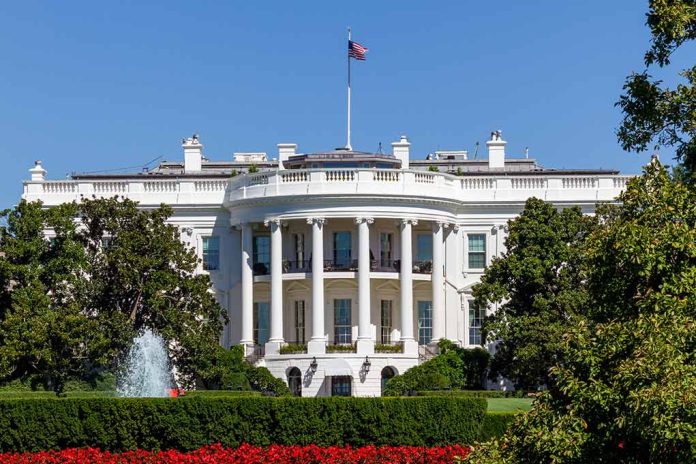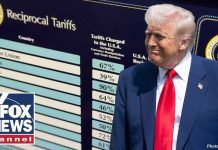
White House Press Secretary Karoline Leavitt blasted CNN as “despicable” for conducting a “softball interview” with a Sinaloa Cartel member, adding fuel to growing conservative outrage over media coverage that appears to normalize violent criminal organizations.
Key Takeaways
- White House Press Secretary Karoline Leavitt condemned CNN for interviewing a Sinaloa Cartel member, calling it a “despicable” and “softball interview” that legitimizes a terrorist organization.
- The interview, conducted by CNN’s Isobel Yeung and aired May 2, featured questions about the cartel member’s thoughts on President Trump and potential remorse for his actions.
- Conservative critics argue the interview normalized a violent drug cartel while failing to adequately address their heinous crimes against Americans.
- Leavitt suggested such reporting contributes to declining public trust in legacy media outlets.
- The Sinaloa Cartel has been officially designated as a foreign terrorist organization during President Trump’s administration.
White House Condemns CNN’s “Platform” for Cartel Member
In a strongly worded rebuke, White House Press Secretary Karoline Leavitt slammed CNN for airing what she described as a “softball interview” with a member of Mexico’s notorious Sinaloa Cartel. The interview, conducted by CNN International Correspondent Isobel Yeung, aired on May 2 and featured a masked cartel member involved in fentanyl production who was granted anonymity. Leavitt expressed shock at CNN giving airtime to an organization now officially designated as a foreign terrorist group by the Trump administration, particularly questioning the deferential nature of the interview.
“It was a softball interview giving a platform to a notorious drug cartel that has killed American citizens,” said Karoline Leavitt, White House Press Secretary.
CNN’s Controversial Interview Questions Spark Outrage
The interview that triggered the White House response included questions that many conservatives viewed as inappropriate, given the violent nature of the cartel. Rather than focusing exclusively on the organization’s crimes, CNN correspondent Yeung asked the cartel member about his thoughts on President Trump and whether he felt remorse for his actions. One particularly controversial moment came when Yeung asked, “What’s your message to Donald Trump if he’s watching this?” The question struck many as lending unwarranted credibility to a criminal organization responsible for widespread violence and drug trafficking into the United States.
“According to the Trump administration, you are a terrorist… What do you make of that?” asked Isobel Yeung, CNN International Correspondent.
Media Ethics and Public Trust at Issue
Leavitt appeared on Fox News Channel’s Hannity to voice her concerns, suggesting that CNN’s approach to the interview exemplifies why Americans are increasingly distrustful of mainstream media outlets. The press secretary emphasized that giving a platform to terrorist organizations without appropriately challenging them undermines journalistic integrity and public confidence in news reporting. Fox News hosts joined in criticizing CNN, with Lawrence Jones pointedly asking why the network didn’t focus more on the cartel’s violent crimes against innocent victims, including women.
“Well, it was fascinating to me, Sean. I was scrolling on Instagram when I came across this interview, And it stopped me in my tracks, not just because they sat down with a member of a Mexican cartel that is now designated as a foreign terror organization by the United States government, but because of the nature of the questions of this notorious foreign terrorist,” said Karoline Leavitt, White House Press Secretary.
“I thought it was quite despicable, but again, this is just another reason why the trust in the legacy media is at an all-time low amongst the American public,” added Leavitt, highlighting growing concerns about media responsibility.
Broader Implications for Border Security Policy
The controversy over CNN’s cartel interview comes amid President Trump’s intensified focus on border security and cracking down on drug cartels. The administration’s designation of the Sinaloa Cartel as a terrorist organization represents a significant policy shift in how the government addresses Mexican drug trafficking organizations. Critics of the CNN interview argue that such coverage potentially undermines these security efforts by normalizing cartel operations rather than emphasizing their terrorist designation and the devastating impact of their drug trafficking operations on American communities battling the fentanyl crisis.
The cartel member acknowledged in the interview that the United States remains their primary market for drugs, inadvertently highlighting the ongoing security challenges at the southern border that the Trump administration has prioritized addressing. Conservative commentators have pointed to this admission as further evidence of the need for stricter border enforcement policies to combat the flow of illegal drugs into American communities.



